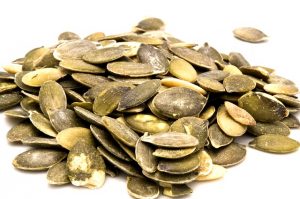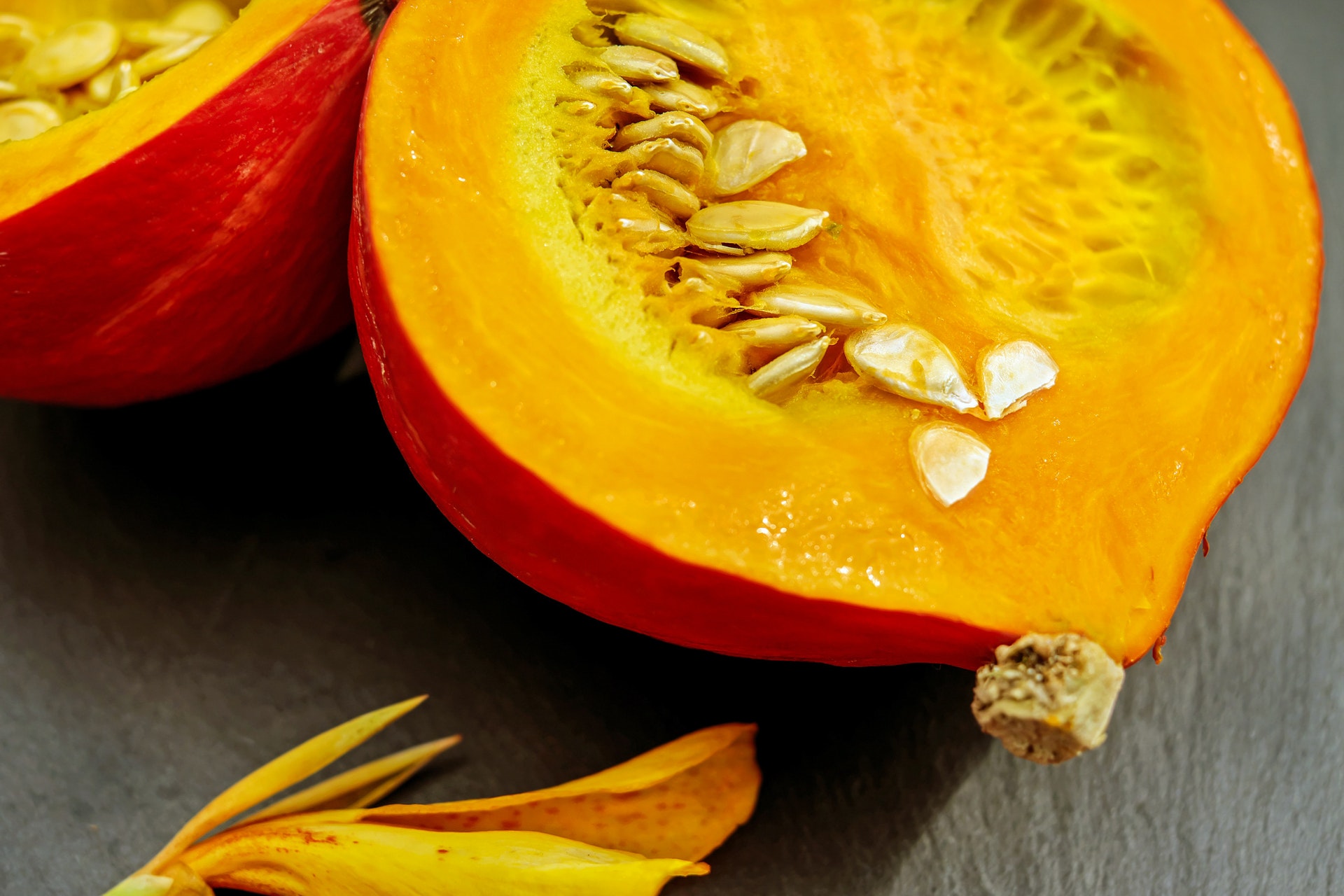Pumpkin seeds seem to be an effective natural remedy for relieving the urinary symptoms of BPH.

Pumpkin seeds are the edible seeds of a pumpkin. Known for their nutritional and medicinal qualities, pumpkin seeds have been suggested to help with prostate health by:
- Alleviating BPH. Pumpkin seeds may help improve symptoms of benign prostatic hyperplasia (BPH) by inhibiting the enzyme 5-alpha reductase.
Overview
Pumpkin seeds are the edible seeds of various pumpkin varieties. These seeds are highly nutritious, containing notable levels of fats, protein, fiber, and micronutrients such as magnesium and zinc. In addition, pumpkin seeds have medicinal uses and have been associated with improved cardiovascular, prostate, and urinary health, and contain numerous antioxidants. 1
In the context of prostate health, pumpkin seed is one of the most widely-used natural remedies for benign prostatic hyperplasia (BPH). Although not as popular as saw palmetto, virtually all studies of pumpkin seed for improving the urinary symptoms of BPH have been positive, and suggest that it is about as effective as prescription medications.
Pumpkin seeds can be effectively used in a variety of forms, including raw seeds, seed oil, and seed extract.

How Pumpkin Seed Might Help With Prostate Health
Inhibition of 5-alpha-reductase
Pumpkin seeds contain phytosterols (plant-derived compounds similar to cholesterol) that have been consistently demonstrated to inhibit the enzyme 5-alpha-reductase, which converts testosterone into DHT (dihydrotestosterone).2 DHT has been implicated in the development of an enlarged prostate.
Pumpkin Seed Uses & Benefits for Prostate Health
Similar to saw palmetto, pumpkin seed products are a popular herbal option for relieving the urinary symptoms of BPH, such as frequent urination, difficulty urinating, and nocturia. This use is backed by high-quality clinical research on pumpkin seeds, oil, and extract, which have shown consistent improvement of BPH prostate symptoms and related quality of life scores. In addition, a few studies that compared pumpkin seed products to pharmaceutical drugs found that they had similar efficacy.

Research
Animal Research
Animal studies of pumpkin seed in the context of prostate and urinary health indicate that:
- A diet rich in fluted pumpkin seeds “inhibited the induction of BPH in rats” and can “alleviate the signs of BPH” 3 4
- In rats, pumpkin seed oil can “inhibit testosterone-induced hyperplasia of the prostate and therefore may be beneficial in the management of benign prostatic hyperplasia” 5
- Pumpkin seed extract improved markers of urinary function in rabbits, reducing bladder pressure and urethral pressure, and improving bladder compliance 6
Human Research
Clinical studies demonstrate that different forms of pumpkin seed (raw, extract, oil) can alleviate the symptoms of BPH and other urinary disorders.
Purified pumpkin seeds (10 g) appear to improve symptoms of BPH
This randomized, partially-blinded, placebo-controlled study looked at the efficacy of pumpkin seed for lower urinary tract symptoms (LUTS) associated with BPH. A total of 1431 men were given placebo, purified pumpkin seed (Granu Fink Kürbiskerne, 10 g), or pumpkin seed extract (Granu Fink prosta forte, 1000 mg) daily for 12 months. Compared to placebo, only the pumpkin seed group had significant improvement of prostate symptom scores, and a larger percentage of individuals who experienced significant improvement (58.5% vs only 47.3% for placebo). On the other hand, the extract group did not do better than placebo.
- The researchers concluded that “Overall, in men with BPH, 12 months of treatment with pumpkin seed led to a clinically relevant reduction in IPSS compared with placebo.” 7
Pumpkin seed oil (320 mg) appears to improve symptoms of BPH
This randomized, double-blind, placebo-controlled study looked at the efficacy of saw palmetto and pumpkin seed oil in BPH. A total of 47 patients (average age 53) were given placebo (group A), pumpkin seed oil (320 mg – group B), saw palmetto oil (320 mg – group C), or a combination of the two (group D), daily for 12 months.
Groups B, C, and D experienced improvement of prostate symptoms and quality of life scores, and maximal urinary flow rate also improved in groups B and C. These results not only showed that pumpkin seed oil was effective, but also that its combination with saw palmetto did not lead to any further improvements.
- The researchers concluded that “…pumpkin seed oil and saw palmetto oil are clinically safe and may be effective as complementary and alternative medicine treatments for benign prostatic hyperplasia.” 8
Pumpkin seed extract Prosta Forte appears to improve BPH symptoms
This study examined the efficacy of branded pumpkin seed extract Prosta Fink Forte for BPH. A total of 2,245 BPH patients were given 1-2 capsules of the extract daily for 12 weeks. They experienced a 41.4% improvement in scores of prostate symptoms and 46.1% improvement in quality of life.
- The researchers concluded that “Prosta Fink Forte facilitates an efficient improvement of BPH symptoms, especially in early stages.” 9
Pumpkin seed oil Prostafit appears to improve BPH
This randomized study compared the efficacy of Prostafit, a branded pumpkin seed oil supplement, with prazosin, a drug used to treat urinary symptoms of BPH. A total of 100 people received either 2 prostafin (group 1) or prazosin (group 2) capsules daily for 6 months. Both groups improved in scores of prostate symptoms (18 people in group 1 vs 22 in group 2) and quality of life (25 vs 31).
- The researchers concluded that “Prostafit is an effective and safe treatment in Benign Prostatic Hyperplasia but not as much as prozasin.” 10
This study examined the use of pumpkin seed oil for overactive bladder (OAB), a condition that can be caused by BPH in men. A total of 45 people were given pumpkin seed oil (10 g) daily for 12 weeks. The treatment significantly reduced scores of urinary symptoms including the frequency of daytime and nighttime urination, frequency of sudden urge to urinate, and frequency of leaking urine.
- The researchers concluded that “…pumpkin seed oil extracts from C. maxima as well as from C. pepo are effective for urinary disorders such as OAB in humans.” 11
Dosage for Prostate Health
- Successful studies have used 10 g of pumpkin seed, 320 – 10,000 mg oil, and unspecified extract doses
- Pumpkin seed supplements typically supply 1000 mg softgel doses
- Multi-ingredient prostate health supplements typically include 300 – 1000 mg of pumpkin seed oil or small (~25 mg) extract doses
Available Forms
Pumpkin seed products come in three major forms, all of which seem to be equally supported by clinical research:
- Pumpkin seeds. This is the ideal form for those who prefer eating foods rather than supplements to improve their health.
- Pumpkin seed oil. Sold in softgels, this is the most popular pumpkin seed supplement form.
- Pumpkin seed extract. An extract made from pumpkin seeds that can be standardized to contain a certain % of fatty acids.
- In addition, there are branded products such as Granu Fink® prosta forte, some of which have been examined in research studies.
Supplements in Review Recommendation
- Pumpkin seed oil softgels, 2000 – 4000 mg daily for prostate health.
We recommend trying out pumpkin seed for BPH. Both animal & human research has reported positive results for pumpkin seed’s ability to alleviate the urinary symptoms of BPH.
Pumpkin seed oil softgels are the most convenient. You can also eat raw/roasted pumpkin seeds or buy an extract since human research has shown all 3 forms to be effective, but we recommend the oil because it is the most convenient.
Leave a Reply